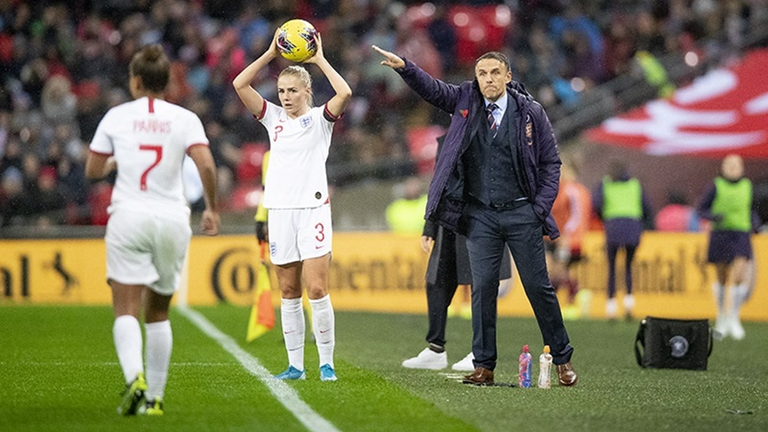Assalam O Alaikum All Dear #BlurtBlog Friends::
Hello everyone, I hope you are all well and have a happy life. I am good too thank god I'm glad to see this wonderful community. I hope you like it.
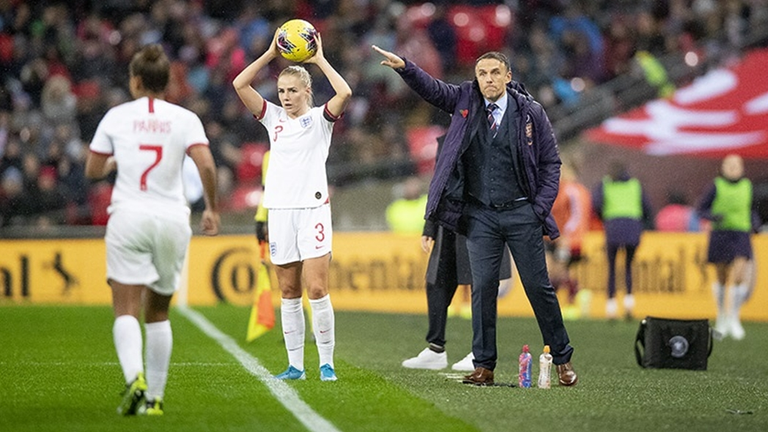
History of women's football:
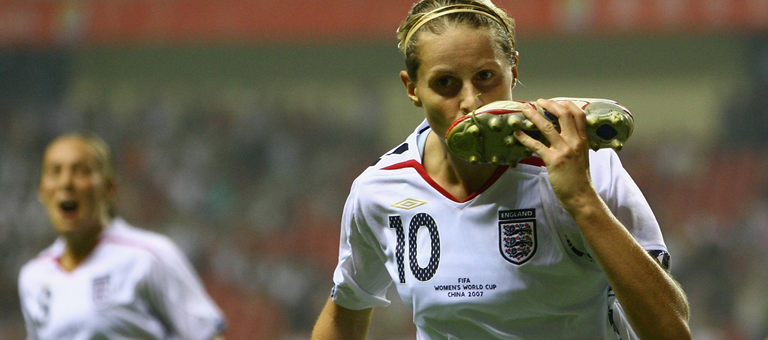
THE HISTORY OF WOMEN'S FOOTBALL IN ENGLAND::
Women's football came under the auspices of the FA in 1993, but its history stretches back much further
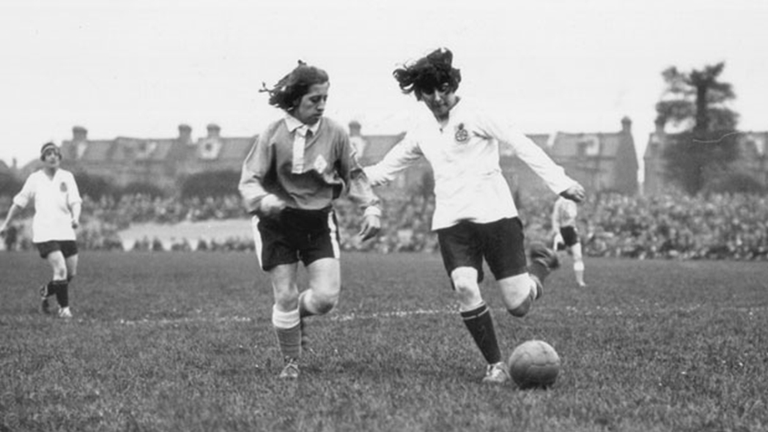
Women’s football has a longer history than most people would expect.
There were a number of women’s clubs in the 1890s and one in north London was reported to have attracted a 10,000 gate to a game at Crouch End.
Preston was the stronghold of women’s football in its early days, the famous Dick Kerr’s Ladies being formed there in 1894 and earning a lot of money for charity.
Their match with St Helen’s Ladies on Boxing Day 1920 had 53,000 inside Goodison Park and thousands locked outside.
The FA banned women’s football from its clubs’ grounds but its view that football was ‘quite unsuitable for females’ changed towards the end of the 1960s.
The Women’s FA (WFA) was formed in 1969 and within three years the first 'Women’s FA Cup Final' and England Women’s international had been played.
The FA invited the WFA to affiliate on the same basis as a County Association in 1983 and ten years later established a Women’s Football Committee to run the women’s game in England.
Doncaster Belles were the first winners of the Women’s FA Cup, England won their first international under the FA’s auspices 10-0 in Slovenia and the FA began to administer a new FA Women’s Premier League with three divisions.
The FA outlined its plans to develop the women’s game from grassroots to elite level in 1997 and in the following year appointed Hope Powell as the England Women’s national coach.
Football had become the top participation sport for women and girls in England by 2002 and the profile of the women’s game was further boosted by the hosting of major tournaments in 2005 and 2012, with England’s achievement in reaching one European Final and two World Cup quarter finals, and the launching of The FA Women's Super League.
A brief history...
1895: The first women's football match. North beat South 7-1.
1920: The first women’s international game. Preston-based Dick Kerr’s Ladies beat a French XI 2-0. Attendance: 25,000.
1920: The biggest crowd to date for a women’s game. On Boxing Day, 53,000 watch Dick Kerr's Ladies beat St Helen's Ladies 4-0.
1921: The FA bans women from playing on Football League grounds. “…the game of football is quite unsuitable for females and ought not to be encouraged."
1969: The Women's Football Association (WFA) is formed with 44 member clubs.
1971: The FA Council lifts the ban which forbade women playing on the grounds of affiliated clubs.
1971: In the first Women's FA Cup Final, Southampton beat Stewarton and Thistle 4-1.
1972: The first official women's international in Britain is played at Greenock. England beat Scotland 3-2.
1983: The FA invites the WFA to affiliate on the same basis as County Football Associations.
1984: England reached the final of the inaugural European Competition for women's football, after beating Denmark by 3-1 on aggregate in the semi-finals. They went on to face Sweden in the final, losing the first leg by 1-0 after a header from Pia Sundhage, but won the return leg by the same margin thanks to a goal from Linda Curl. The Lionesses lost the subsequent penalty shootout by 4-3. Theresa Wiseman saved Helen Johansson's penalty but both Curl and Lorraine Hanson had their spot kicks saved by Elisabeth Leidinge.
1991: The WFA launches a national league, which kicks-off with 24 clubs.
1993: The FA establishes a Women's Football Committee and the post of Women's Football Co-ordinator.
1993: The WFA National Cup competition is brought under the control of the FA and becomes the Women’s FA Challenge Cup. 137 teams enter.
1994: The FA takes on the administration of the Women's National League and League Cup competition. The league becomes The FA Women's Premier League (FAWPL).
1997: The FA outlines its plans to develop the women's game from grassroots to elite level.
1998: The first 20 Centres of Excellence for girls are established. Sponsors are gained to both the League and Cup competitions.
1998: Hope Powell is appointed as the first full-time coach for the England women's international sides.
1999: The USA hosts the FIFA Women's World Cup which sees sell out stadia and over 90,000 at the Final.
2002: The FA announces that football has become the top participation sport for girls and women in the England – three years ahead of schedule.
2005: The 2005 UEFA Women's Championship is played in England. The opening match attracts an unprecedented 29,092 spectators, with a further 2.9m people watching live on BBC Two, while the tournament overall entertains 115,816 fans in 15 matches. England go out in the group stages.
2006: After a 12-year gap, England qualify for the FIFA Women’s World Cup, to be played in China.
2007: Arsenal become the first British side to win Europe’s top club prize, the UEFA Women’s Cup.
England U19s secure their place at the U20s FIFA Women’s World Cup in Chile.
England senior team travel to China for the FIFA Women’s World Cup, and reach the quarter finals, losing to the USA.
2008: Everton cause a huge surprise as they beat Arsenal 1-0 in the FA Premier League Cup Final, the Gunners’ first defeat in more than 50 games.
However, Arsenal go on to secure their fifth straight Premier League and complete the double, winning The FA Women’s Cup, in front of a record 24,582 crowd at Nottingham Forest FC.
England U17s compete in the first FIFA Women’s U17s World Cup, held in New Zealand. They reach the semi-finals, losing out narrowly to North Korea.
England U20s compete in the U20s FIFA Women’s U20s World Cup in Chile and reach the quarter finals, losing out to USA.
England’s Senior team qualify for the UEFA Euro 2009 Finals, to be played in Finland in 2009.
2009: Arsenal achieve triple success, winning the FA Women’s Premier League Cup Final 5-0 against Doncaster Rovers Belles, the Women’s FA Cup, edging Sunderland 2-1 before a crowd of 23,291 at Pride Park and their sixth successive Premier League crown.
England senior team win the Cyprus Cup, beating Canada in the final to win their first international trophy.
The England senior team reach the UEFA Championship Final for the first time in 25 years, losing out to Germany in Finland, while the U19s won their UEFA Championship in Belarus.
2010: Arsenal were Premier League champions again but Leeds Carnegie won the Premier League Cup and Everton won the Women’s FA Cup.
England’s U19s under Mo Marley reached the UEFA Championship Final once again, this time losing narrowly to France in Macedonia.
It was announced that the new ‘Women’s Super League’ would start in the following spring.
2011: The FA Women’s Super League (FA WSL), an innovative eight-team summer competition, was launched in April. Arsenal beat Chelsea 1-0 in the inaugural match at Tooting and went on to lift the title. They also won the WSL Cup, the ‘Continental Cup’, to add to their Women’s FA Cup success.
The England Women’s team reached the quarter final stage of the FIFA World Cup in Germany before going out to France on penalties.
2012: The popularity of women's football in England was escalated by the success of Team GB Women who reached the quarter finals of the London Olympics.
Arsenal retained their FA WSL title, Birmingham won The FA Women's Cup for the first time and the England senior team qualified unbeaten for Euro 2013.
It was announced in March that England would stage the 2013-14 UEFA European Women's U17 Championship Finals.
2013: England won the Cyprus Cup for the second time but failed to make it beyond the group stage at the European Championship Finals.
After 15 years and 162 matches as England head coach, Hope Powell left her role. Bristol Academy manager Mark Sampson was appointed as the new England boss with former Three Lions striker Marieanne Spacey as assistant.
The FA celebrated 150 years of running football and also marked 20 years of supporting the women's game.
Liverpool won The FA WSL title and Arsenal lifted The Women’s FA Cup.
The FA, Sport England, The Premier League and The Football League Trust launched their first joint national participation programme for girls’ football.
2014: England Women played their first match at the new Wembley Stadium, attracting a record crowd of 45,619 for their match against Germany.
Fara Williams set a new England appearance record when she helped the Lionesses defeat Sweden 4-0 in Hartlepool on her record-breaking 130th cap.
Arsenal won the Women's FA Cup again and Liverpool retained their FA WSL title on goal difference, on an exciting final day of the season.
2015: England won bronze at the FIFA Women's World Cup in Canada and inspired an army of Young Lionesses to take up the game.
SSE were announced as the new sponsor of the re-named Women's FA Cup and the Final was played at Wembley Stadium for the very first time. A record Final crowd of 30,710 watched Chelsea edge Notts County 1-0.
The Blues went on to win FA WSL 1 and in doing so clinched a historic double.
2016: England captain Steph Houghton and most-capped player Fara Williams were awarded MBEs in the New Year's Honours List.
Baroness Sue Campbell was announced as the new Head of Women's Football.
2017: England reached the semi-finals of UEFA Euro 2017.
2018: Phil Neville was appointed as England Women’s head coach in January.
2019: England won the SheBelieves Cup for the first time before going on to finish fourth at the FIFA Women’s World Cup in France, with their semi-final defeat by USA attracting a record 11.7m viewers on BBC One.
As England are the nominated country for Great Britain, this means a Team GB women’s football team qualified to participate in the 2020 Tokyo Olympic Games.
Another record was established in the Women’s FA Cup Final, with 43,264 fans watching Manchester City defeat West Ham 3-0 under the arch.
In March, Barclays were announced as title partner of The FA WSL, in what is believed to be the biggest-ever investment in UK women’s sport by a brand.
The Lionesses rounded off another hectic year by attracting 77,786 fans to Wembley Stadium for a 2-1 defeat by Germany on 9 November. It was a record crowd for an England Women's match.
2020: The FA's three-year 'Gameplan for Growth' strategy for the women's game comes to an end, with impressive numbers revealing over 3.4m women and girls involved in football participation, an increasing fanbase for both the WSL clubs and England team as well as higher numbers of qualified female coaches and officials.
There was also a new name to lead the England senior team, with Netherlands coach and former FIFA Best Female Coach winner Sarina Wiegman appointed to take over as Lionesses head coach from September 2021.
2021: England Women's head coach Phil Neville leaves his role early to take on a job with Miami Heat in the USA, with Norwegian star Hege Riise taking over as coach until Wiegman's arrival later in the year. She wins her first game in charge, and the first for almost a year, with a 6-1 victory over Northern Ireland.
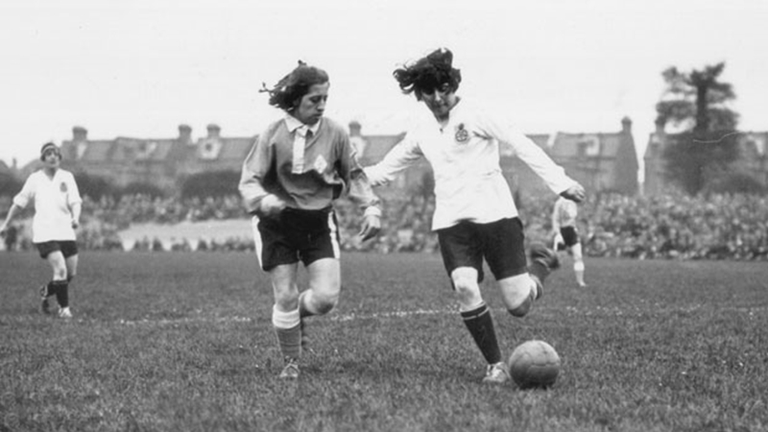
'A killer blow'
The FA
Phil Neville could not hide his disappointment after his England Women’s team were defeated 2-1 by Germany in front of 77,786 fans at Wembley Stadium.
It was a record attendance for the Lionesses but Klara Buhl’s 90th-minute winner put a dampener on the historic occasion.
Neville said: “We wanted to beat the second-best team in the world and that was a real killer blow at the end.
“The first 22 minutes and the last eight minutes have cost us. We weren’t good enough and Germany were better in those periods and that’s why they won the game.
“I thought we competed well. We conceded late because we did not use our experience in game management. The players are devastated as they wanted to get a good result.
“I can’t fault the players’ endeavour, but some mistakes are costing us.”
Germany captain Alexandra Popp headed her side into a deserved ninth-minute lead and Ellen White equalised just before the break.
Nikita Parris saw her penalty saved by Merle Frohms midway through the first half and Buhl scored late on as Germany made it back-to-back wins over England at Wembley following their 3-0 success in November 2014.
Neville added: “I thought we were lucky to [be only] 1-0 [down]. After 22 minutes we started to play how we wanted to play.
“From 22 minutes to 82 minutes the game went exactly how we thought it would go.
“The emotional control in the first part of the game is something we need to work on, those real critical moments. That is top-class football. You cannot for a split second lose concentration, you cannot for one second switch off.
“It’s that consistency of performance and behaviour that we’re trying to find.”
The defeat means England have won only one game, against Portugal, since reaching the World Cup semi-finals in the summer.
And Neville was in no mood to sugar-coat his side’s results this season.
He said: “There’s no hiding away from it. One win in seven is totally unacceptable. It’s not what I see as success and we need to do something about it very, very quickly.
“We can talk about coming down from the emotional highs of the World Cup but when you get to November that becomes an excuse. We’re not having any excuses.
“It starts with me. I’ve got to take responsibility for those results. I’m the one who picks the team, I’m the one who sets the tactics.
“The team always reflects the manager. At this moment in time the results aren’t good enough which means that I’ve not been good enough.”
England take on Czech Republic on Tuesday night, a match you can watch live on The FA Player, and Neville wants his players to end the year on a winning note.
He added: “We wanted to win tonight and it’s a massive disappointment.
“But the players have to pick themselves up. That’s what the best players do: they have to go through disappointment and success. It’s a challenge.
“It’s my job to pick the right team to get a result in the Czech Republic. It will be a massive test for us.”
